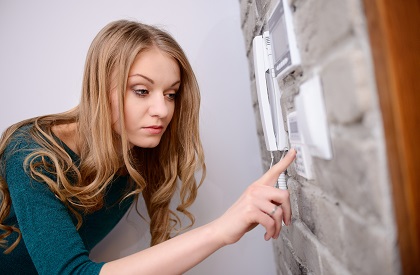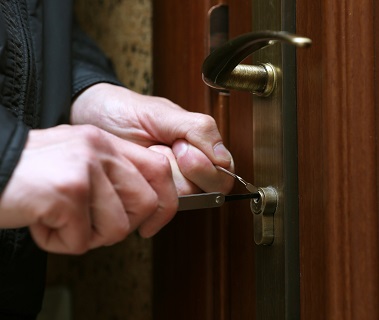
Finding weaknesses in your home’s overall security is simple enough, but you have to know what to look for. All too often, homeowners overlook some small detail that burglars are all too prepared to exploit. For this reason, we recommend you consult with a security expert.
In this article, we’ll discuss what to focus on when assessing your home’s overall security and provide you with a security checklist created by the National Crime Prevention Council.
Take Account of All Doors & Windows
The first thing you should do when assessing your home’s security is walk the perimeter and take note of any place a burglar could potentially enter your home. How many doors do you have? How many windows? Do you have any garage doors? Do you have any outbuildings? Are there any ladders lying about that could be used to access a 2nd story window?
 What is currently stopping a burglar from getting in your house? These are the sorts of questions you need to be asking yourself as you assess your home’s defenses. Don’t leave any stone unturned (and don’t leave keys in plastic stones). Remember, burglars aren’t opposed to crawling through a small basement window or doggy door, and they often find convenient ways to reach a 2nd story window or balcony.
What is currently stopping a burglar from getting in your house? These are the sorts of questions you need to be asking yourself as you assess your home’s defenses. Don’t leave any stone unturned (and don’t leave keys in plastic stones). Remember, burglars aren’t opposed to crawling through a small basement window or doggy door, and they often find convenient ways to reach a 2nd story window or balcony.
Start with High Quality Deadbolts
Burglars, for the most part, are opportunists. They’re looking for the easiest and most discrete route into your home. Before burglars go crawling through a basement window, it’s likely they’re going to try to get in through an unlocked door or a door with weak defenses.
In fact, about 30% of burglars enter a home through an unlocked door. Teach your family about the importance of keeping doors locked, all the time. The remaining 70% use force. This is where you want good sturdy locks that aren’t going to be easy to bump or get past.
Arming Doors and Windows
If a burglar does manage to get past a window or a dead bolted door, an alarm system is your next layer of defense. There are a few alarm system strategies that can be used at this point, but one of the most effective strategies is to arm doors and windows with contact-point sensors that are triggered when that contact point is broken.
Glass Break and Motion Sensor Protection
Contact-point style alarms have a discernible weakness when it comes to windows. An easy way to surpass a window with a contact-point sensor would be to break the glass and go through the window without opening it. This is where your next level of defense comes in: glass break and motion sensors.
Shine Some Light on the Situation
The next assessment you should make on your home is perimeter lighting. How well-lit is it around your home? Do you have motion sensor lights at your back entrance? While about 65% of burglaries occur during the day when most houses are empty, you still want to protect yourself from falling into the 35% group that will be burglarized at night.
Motion triggered flood lights around your perimeter will help discourage some nighttime burglars. Another great way to utilize lights in your home’s overall security is with lights set on an automatic timer. While lighting can be a good way to discourage burglars from targeting your home, but it shouldn’t be your only defense and doesn’t actually do anything to prevent burglars from entering a house.
Surveillance Cameras Discourage Burglars
If your home has secure locks, a well-lit exterior, and security equipment, and you want to add more protection, security cameras are the next logical step. Burglars tend to avoid doing anything that will leave a trace or link them back to the crime, and studies have proven that security cameras are an effective burglary deterrent.
We’ve already mentioned that you’re 50% more likely to be robbed by a day-time burglar. These day-time burglars don’t typically go around wearing masks, because masks bring unwanted attention. Instead, they often disguise themselves as HVAC repairmen or some other service company.
 Arm Your Homes with Locks, Lights, Alarms, and Cameras
Arm Your Homes with Locks, Lights, Alarms, and Cameras
Download and print this Home Security Checklist from the NCPC and walk the perimeter of your home to find weaknesses. A few well-placed security cameras, an electronic security system, automatic lights, and good solid locks will make your home far less desirable to the average burglar.
Contact Butler Durrell Security to set up a private consultation with one of our residential security experts and get a full, professional assessment of your home’s defenses.



